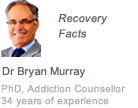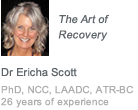Addictive Personalities
Addictive personalities do exist. People have traits that can predispose them to addiction, they are more prone to use and abuse drugs and more likely to become addicted. Of course any person can become an alcoholic or a drug addict, regardless of wealth, age, status or lifestyle, but for those with an addictive personality the risks are higher.
Addictive personality disorders (APD)
People with addictive personality disorders are very sensitive to stress. They may have little self-esteem, and can appear extremely indulgent, perhaps gorging on chocolate frequently, or obsessively playing internet games or working out many times each day. Other noticeable traits of people with an addictive personality disorder might include refusal to engage in social gatherings, a desire to isolate themselves and excessive consumption of cigarettes, caffeine or drugs. APD sufferers find it difficult to manage their stress levels and a lack of stress tolerance can be a sign of the disorder.
Often greatly insecure in relationships, people with APD find it difficult to make commitments or trust their partner. They constantly seek approval and acceptance from those around them, and can be difficult to reassure. Depression, anxiety and stress are all features of APD, sufferers have difficulty managing and controlling their emotions.
Common types of addictive behavior
Drug abuse and dependence is one of the most common displays of addictive personalities. A mix of narcotics, stimulants and anti-anxiety drugs and alcohol are favored by those with APD. APD sufferers also succumb to gambling, eating disorders and obsessive exercising. Compulsive behavior can also encompass working to extreme levels, constant concern about physical appearance, to the point of having repeated plastic surgery. Addiction to surgery is another problem for some APD sufferers.
Treating APD and the addictions
Both the personality disorder and the consequent addictions must be addressed if an APD victim is to stand any chance of recovery. A combination of psychotherapy, cognitive behavioral therapy and other emotionally supportive activities designed to enable the individual to deal first with the APD on a daily basis, and then any and all addictions.
Detox and residential rehab is greatly desired, providing a safe environment for the unfortunate addict to learn a new approach to dealing with their problems. Medical intervention may be necessary as well, and again, residential rehab is best for managing, monitoring and treating drug withdrawal symptoms safely.
Helping an individual who has an addictive personality is not easy. Treatment is complex, and long-term. But first getting the person to understand that they have a problem is the biggest hurdle. Once the addict accepts and faces the issues, as tough as treatment will be, they can get through it and take back the life that should have been theirs.












